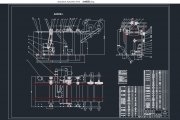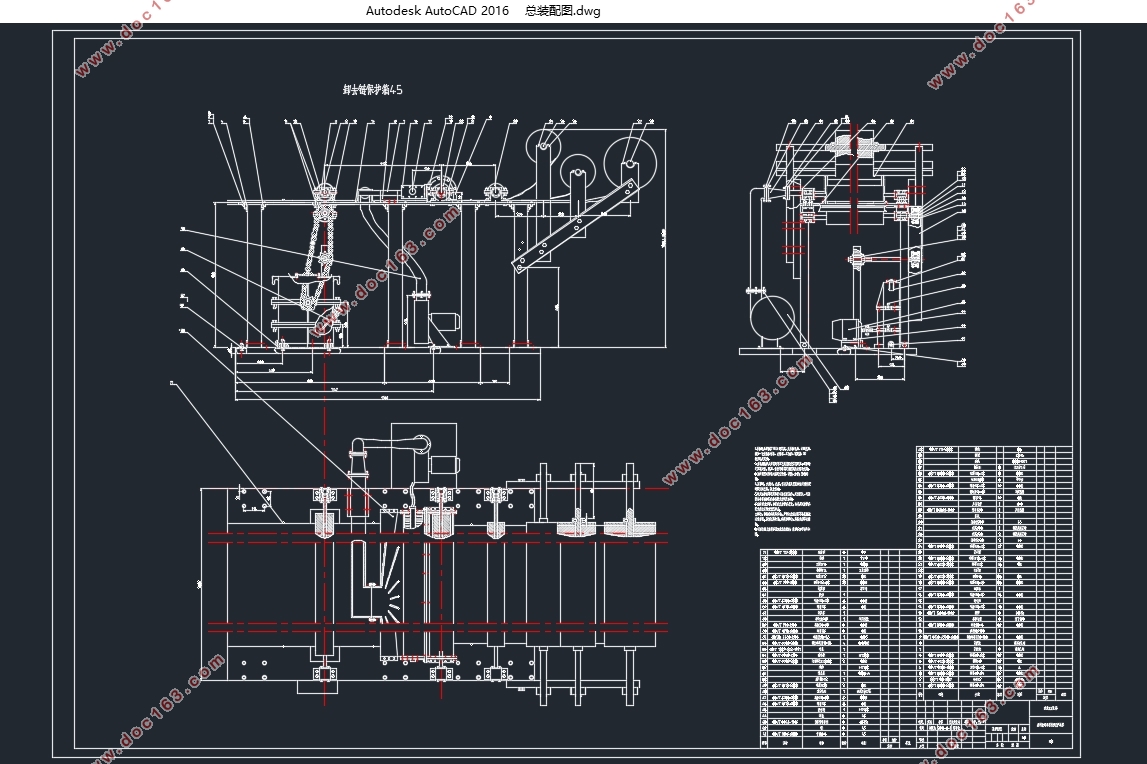热耦合纤维增强板生产装置设计(含CAD零件图装配图)

热耦合纤维增强板生产装置设计(含CAD零件图装配图)(论文说明书6000字,CAD图13张)
摘要
聚四氟乙烯具有耐高温、高润滑、耐腐蚀、耐低温、无毒害、耐气候、绝缘性、不粘性等各种优点,但是机械性能不好,而玻纤的加入能够大大地改善了它的物理机械性能, 通用塑料经过增强后, 也能作为工程材料采应用。因而增强板在化工、电子、机械、电器、军工、环保、桥梁和航天等国民经济领域中能够起到了举足轻重的作用。
本文对各种增强版的特性用途以及各种成型方法进行简介;并介绍了热耦合玻璃纤维增强聚四氟乙烯板一套生产装置的设计及计算--热风法纤维增强板的装置设计,包括加热装置,冷却装置,牵引系统以及机架系统的设计及计算
关键词:热风法 增强板 玻璃纤维布 聚四氟乙烯 生产装置
Esign of thermal coupled fiber reinforced plate production equipment
Abstract
Polytetrafluoroethylene (PTFE) has the advantages of high temperature resistance, high lubrication, corrosion resistance, low temperature resistance, no poison, weather resistant, insulation, not sticky and various advantages, but the mechanical performance was not good, and glass fiber added to greatly improves the physical and mechanical properties of it, general plastics after enhancements, also can as engineering materials mining application. Thus reinforcing plate in the chemical industry, electronics, machinery, electrical appliances, military, environmental protection, bridge and space areas of the national economy can play the pivotal role. [资料来源:http://doc163.com]
The of various enhanced version of the characteristics of use and various molding methods are introduced; and the thermal coupling of glass fiber reinforced polytetrafluoroethylene plate a production device design and calculation, hot-air method fiber reinforced plate device design, device comprises a heating and cooling device, pull fuze system and frame system design and calculation
Key words: hot air method, reinforced plate, glass fiber cloth, PTFE production equipment
课题名称:热耦合纤维增强板生产装置设计
原始数据:纤维增强板:材质为玻璃纤维布+F46+F4;宽度2200mm;长度大于6500mm;厚度1--20mm。
2、工艺路线、工艺参数以及相应功能要求介绍,相应结构功能及说明。
工艺路线:将F4、F46和玻纤布结合,进入加压设备;经过加热加压(加热温度260℃,压辊压力0.3MPa,)使得熔融F46浸渍玻纤布,然后经冷却固结,定长切断,制得板材
[资料来源:http://www.doc163.com]


目录
摘要 I
Abstract II
计算说明书 2
第一章 设计参数及工艺流程 1
1.1设计参数 1
1.2 工艺流程及说明 1
第二章 加热系统 1
2.1计算加热热量 1
2.2热风机选择 2
第三章 传动部分 3
3.1传动方案 3
3.2 减速器类型 4
3.3 选择电动机 5
[资料来源:www.doc163.com]
3.3.1 选择电动机的种类型号和结构形式 5
3.3.2 选择电动机的功率 6
3.3.3 确定电动机转速 7
3.4 分配传动比 7
3.5 传动装置的运动以及动力参数的计算 7
3.6圆柱蜗轮蜗杆结构设计 8
3.6.1高速级蜗轮蜗杆结构设计 8
3.6.2 低速级蜗轮蜗杆结构设计 10
3.7轴设计 13
3.7.1高速轴Ⅰ轴 14
3.7.2中间轴Ⅱ轴 17
3.7.3低速级Ⅲ轴 21
3.8链轮设计 25
3.9键的校核 25
3.9.1联轴器 25
3.9.2中间轴 26
3.9.3输出轴 26
第四章 冷却装置 26
第五章 机架、工作台以及零部件设计 26
5.1工作台 26
5.2 机架设计 27
参考文献 29 [资料来源:http://doc163.com]
结束语 31
[资料来源:http://www.doc163.com]
上一篇:袋压成型复合管道件生产装置设计(含CAD零件图装配图)
